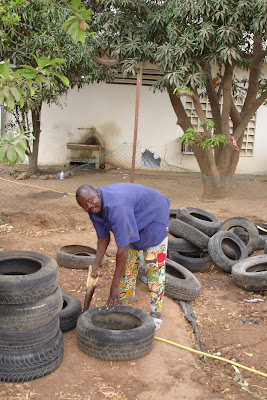In the past two years on this site, one thing I've really wanted you, the reader to do, is to use your own judgments to make conclusions, keep an open mind, and open your horizons. Much of the time, I've tried to keep my opinions to a minimum.
Because I feel many of my peers back home know little about the outside world, past the city they live in and possibly what appears on the nightly news, its important for me to share this article with you all.
What the American people are doing abroad regarding development and global health is important, and quite frankly we are taking the leadership role. Being on the ground here and seeing these dollars utilized ranging from large scale projects with Ministries (governmental not religious) to the most grassroots in villages. When you multiply what is happening just here in Senegal to all African countries, hopefully we (not just the US, but everyone) can eradicate malaria, diminish the wide-spread nature of HIV/AIDS, and increase the overall health of Africans.
You may ask yourselves why we should care as Americans....we are all human.
So, for those of you that think (and consequently debate the justifications) that the U.S. is only focused on the Middle East regarding foreign policy then your wrong. As an American, you should be proud...for many reasons.
--------------------------------------------
By JIM ABRAMS
WASHINGTON (AP) — The House voted Wednesday to triple to more than $10 billion a year U.S. humanitarian spending on fighting AIDS, malaria and tuberculosis in Africa and other stricken areas of the world.
About $41 billion of the $50 billion over five years would be devoted to AIDS, significantly expanding a program credited with saving more than 1 million lives in Africa alone in the largest U.S. investment ever against a single disease.
Every day another 6,000 people are infected with the HIV virus, said House Foreign Affairs Committee Chairman Howard Berman, D-Calif. "We have a moral imperative to act and to act decisively," he said.
The House voted 308-116 to extend and broaden the scope of the $15 billion President's Emergency Plan for AIDS Relief that President Bush promoted and Congress enacted in 2003. It has been hailed as a noteworthy foreign policy success of the Bush presidency.
The White House, which backs the House bill, said the program is supporting anti-retroviral treatment for about 1.45 million people and is on track to meet its goals of backing treatment for 2 million, preventing 7 million new infections and providing care for 10 million, including orphans and vulnerable children.
In 2007, 33 million people worldwide were living with HIV and AIDS, according to the United Nations.
Rep. Ileana Ros-Lehtinen of Florida, top Republican on the Foreign Affairs Committee, added that while the program is based on altruism, it has strengthened U.S. security.
Without addressing the AIDS pandemic, she said, it "will continue to spread its mix of death, poverty and despondency that is further destabilizing governments and societies, and undermining the security of entire regions."
The compromise bill was one of the last endeavors of the former Foreign Affairs Committee chairman, Tom Lantos, D-Calif., who died of cancer in February. The measure is named after Lantos and his predecessor as Foreign Affairs chairman, the late Rep. Henry Hyde, R-Ill., who worked together on the 2003 act.
The Senate Foreign Relations Committee has approved a similar $50 billion bill, and the legislation is seen as having a good chance of passing in an election year in which few major bills will reach the president's desk.
To advance the legislation, conservatives had to give up a provision in the 2003 act requiring that one-third of all HIV prevention funds be spent on abstinence programs. Instead it directs the administration to promote "balanced funding for prevention activities" in target countries.
Liberals, in turn, had to accept some restrictions on family planning groups participating in AIDS programs. Conservatives, concerned that money might be diverted to abortion promotion, pushed for a provision that allows the use of funds for HIV/AIDS testing and counseling services in those family planning programs supported by the U.S. government.
A measure in the 2003 act requiring groups receiving funds to have a policy explicitly opposing prostitution and sex trafficking, opposed by some health groups as impeding efforts among sex workers, was also left intact.
The White House, which originally promoted doubling the program to $30 billion, has expressed concern over the $50 billion figure but not opposed it.
Some conservatives still objected. "This is irrational generosity," said Rep. Dana Rohrabacher, R-Calif., saying the country doesn't have enough money to help veterans and the elderly. "This is benevolence gone wild."
The bill authorizes $10 billion a year, or $50 billion through 2013. Of that, $41 billion is for AIDS prevention and treatment, $4 billion for tuberculosis and $5 billion for malaria. The actual dollars still have to be approved in annual spending bills, but over the last five years Congress exceeded the $15 billion goal, appropriating $19 billion for global AIDS and related programs.
It expands the program, originally focused on 15 mainly sub-Saharan African countries, to include Caribbean nations as well as Malawi, Swaziland and Lesotho in Africa. The goal of the next five years is to prevent 12 million new infections, provide anti-retroviral treatment for 3 million, and train more than 140,000 health care workers. The bill increases coordination with drinking water and nutrition programs and efforts to educate girls and women.
"This will be remembered as the single most significant achievement of President Bush's two terms in office," said Rep. Donald Payne, D-N.J., chairman of the Foreign Affairs subcommittee on Africa.
 Homemade rootbeer in Senegal....could be a first
Homemade rootbeer in Senegal....could be a first Neighboorhood decorations
Neighboorhood decorations Christmas Eve spread...shrimp, chicken, deviled eggs, potato skins, salsa and guacamole, cheeses, cookies, cupcakes, eggnog, rootbeer...can't go wrong
Christmas Eve spread...shrimp, chicken, deviled eggs, potato skins, salsa and guacamole, cheeses, cookies, cupcakes, eggnog, rootbeer...can't go wrong













































